

A Fight Between Cosmetic Surgeons Reveals Online Reviews May Only Be Skin Deep
When cosmetic surgeons are accused of fake online reviews, where can people turn for accurate info? Read the Mashable article featuring ACCO expert Kathryn Dean.

Community Substandards
This report by ACCO members Advocating Against Romance scammers takes a look at how Facebook and YouTube enables and profits off of the Yahoo Boys, an organized criminal group involved in romance scams. Check out the report.


Wildlife Trade on e-Commerce Sites in China, with a Focus on Mammoth Ivory
In August 2020, the Wildlife Justice Commission conducted four months of research into the illegal wildlife trade on Chinese e-commerce platforms. Read the report here.

New whistleblower claims Facebook allowed hate, illegal activity to go unchecked
Read the Washington Post article about our latest complaint to the SEC, which blames top leadership for failing to warn investors about serious problems at the company.

YouTube Sued Over Animal Abuse Videos, Accused of Not Enforcing Ban
ACCO activists Nina Jackel of Lady Freethinker said the site had ignored efforts to get clear violations taken down. YouTube said it had removed hundreds of thousands. Read the NY Times article.

Dead On Arrival (Fentanyl Documentary)
Deceptive drugs made of fentanyl are killing young people across America at an alarming rate. Watch this powerful documentary featuring ACCO members of VOID, whose children lost their lives after ingesting fake prescription pills made of illicit fentanyl through social media platforms.

When one pill kills
Eight parents mourn children poisoned by deadly pills bought on Snapchat. Read the NBC News article featuring ACCO members from VOID and the Alexander Neville Foundation.

Two Clicks Away: Wildlife Sales on Facebook
This study was aimed at surveying whether Facebook has taken substantial action in fulfilling its pledge to remove 80% of wildlife trafficking content from its platforms by 2020. Read the report.

Wildlife in Peril: Animals are Traded, Tortured on Social Media
On social media, it’s easy to find posts advertising big cats, birds and primates for the exotic pet trade, as well as wildlife products made from species such as elephant ivory and pangolin scales. Download the fact sheet.

Wildlife seizures are down—and an illicit trade boom may be coming
A Nat Geo article assessed rates of wildlife trafficking in 2020, asking our experts for their opinions. While seizures for wildlife products such as pangolin scales, elephant ivory and rhino horn appear to have dropped, ACCO experts, who were widely consulted for the article, reported no significant difference in the number of online posts offering the sale of wildlife animals and their parts.

YouTube: Profiting From Animal Abuse
As a result of this report, YouTube banned all fake animal “rescue” videos from its platform. ACCO investigator Lady Freethinker will continue to monitor the platform and hold YouTube accountable to remove animal abuse videos. Read the report.

The black-market trade in wildlife has moved online, and the deluge is 'dizzying'
llegal wildlife ads have increased on Facebook despite its steps to combat animal trafficking. Crime watch groups are calling for broad legal reforms. Read the Nat Geo article on our wildlife report.

Big Data, Natural Language Processing, and Deep Learning to Detect and Characterize Illicit COVID-19 Product Sales: Infoveillance Study on Twitter and Instagram
ACCO expert Tim K Mackey has developed natural language processing and machine learning to identify COVID19 scams on Twitter and Instagram. Organizing this data, he has also created a customized dashboard to enable public health intelligence and provide reports to health authorities. Read the report.

Towards a Method for Discerning Sources of Supply within the Human Remains Trade via Patterns of Visual Dissimilarity and Computer Vision
While bone traders are quick to point out that ‘buying human skulls is legal’, the trading in Indigenous remains is not. In this report, ACCO researchers develop machine learning techniques for identifying the geographic ancestry of human remains advertised on social media to better identify illegal trading.
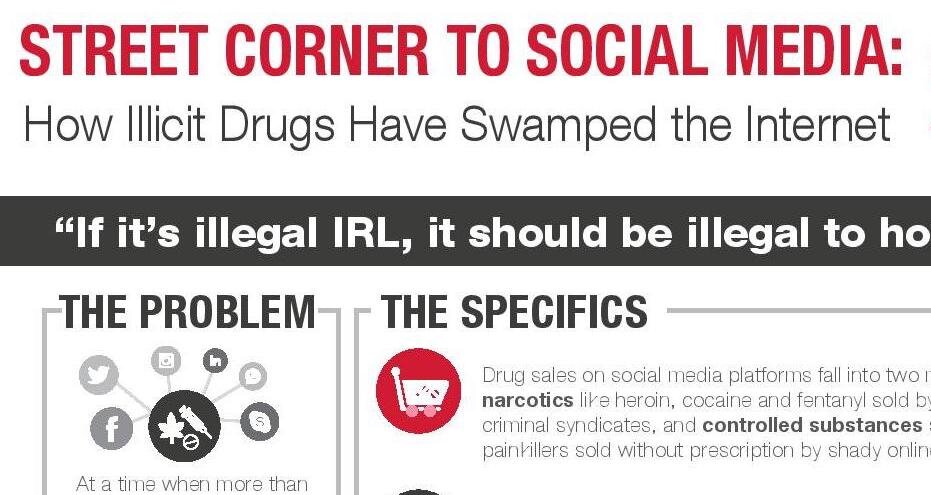
Street Corner to Social Media: How Illicit Drugs Have Swamped the Internet
At a time when more than 60,000 Americans die from drug overdoses each year, dangerous narcotics and fake pharmaceuticals are widely available for purchase on social media platforms. Download the fact sheet.

Whistleblowers say Facebook has not warned investors about illegal activity, in new SEC complaint
The complaint, which was obtained by The Washington Post, includes dozens of pages of screenshots of opioids and other drugs for sale on Facebook and its photo-sharing site Instagram. Read the article.
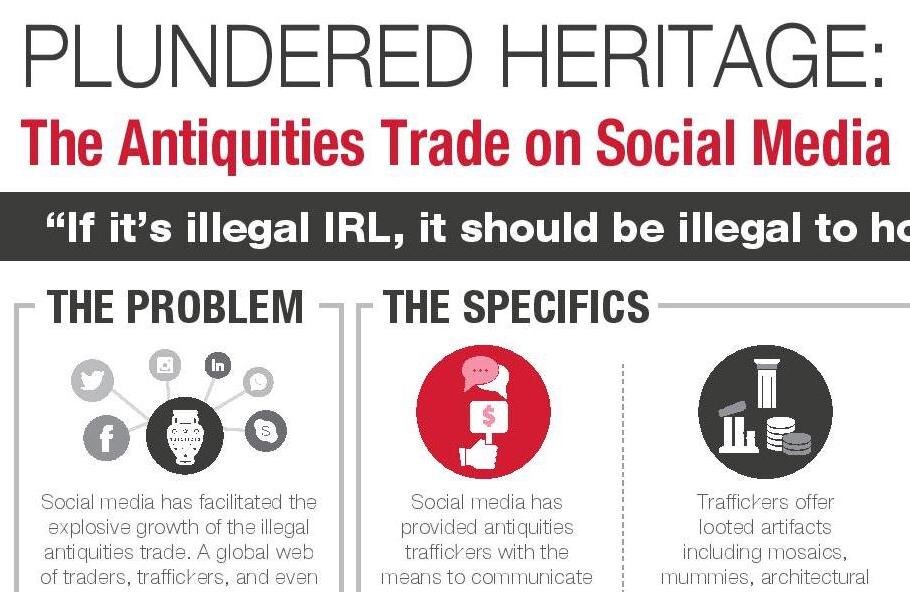
Plundered Heritage: The Antiquities Trade on Social Media Fact Sheet
Social media has facilitated the explosive growth of the illegal antiquities trade. A global web of traders, traffickers and even terrorists use these platforms to buy and sell looted antiquities. Download the fact sheet.

Facebook’s Looted-Artifact Problem
The Islamic State turned the social platform into a global marketplace for stolen relics—until a group of vigilante archaeologists took matters into their own hands. Read The Atlantic Article.

Canada repatriates stolen Egyptian cat artifact
An ancient Egyptian cat statue was recently repatriated. How the cat statue was obtained is unclear, but it is known that it was illegally smuggled. Egyptian officials estimate that tens of thousands of antiquities have been smuggled out of the country in recent years. Shawn Graham, an ACCO Founding member, notes that social media websites like Facebook and Instagram have "super-charged" efforts to sell and obtain stolen items. Read the article.

UNODC World Wildlife Crime Report 2020
The latest UNODC - United Nations Office on Drugs and Crime wildlife report gives new insights on wildlife crime trends around the world with contributions from several ACCO experts including the Wildlife Justice Commission, Dan Stiles and Patricia Tricorache. Read the report.

The Human Remains Trade on Social Media Fact Sheet
Social media algorithms have propelled the growth of human remains trading, which includes everything from mummies to items of indigenous cultural heritage. Download the fact sheet.
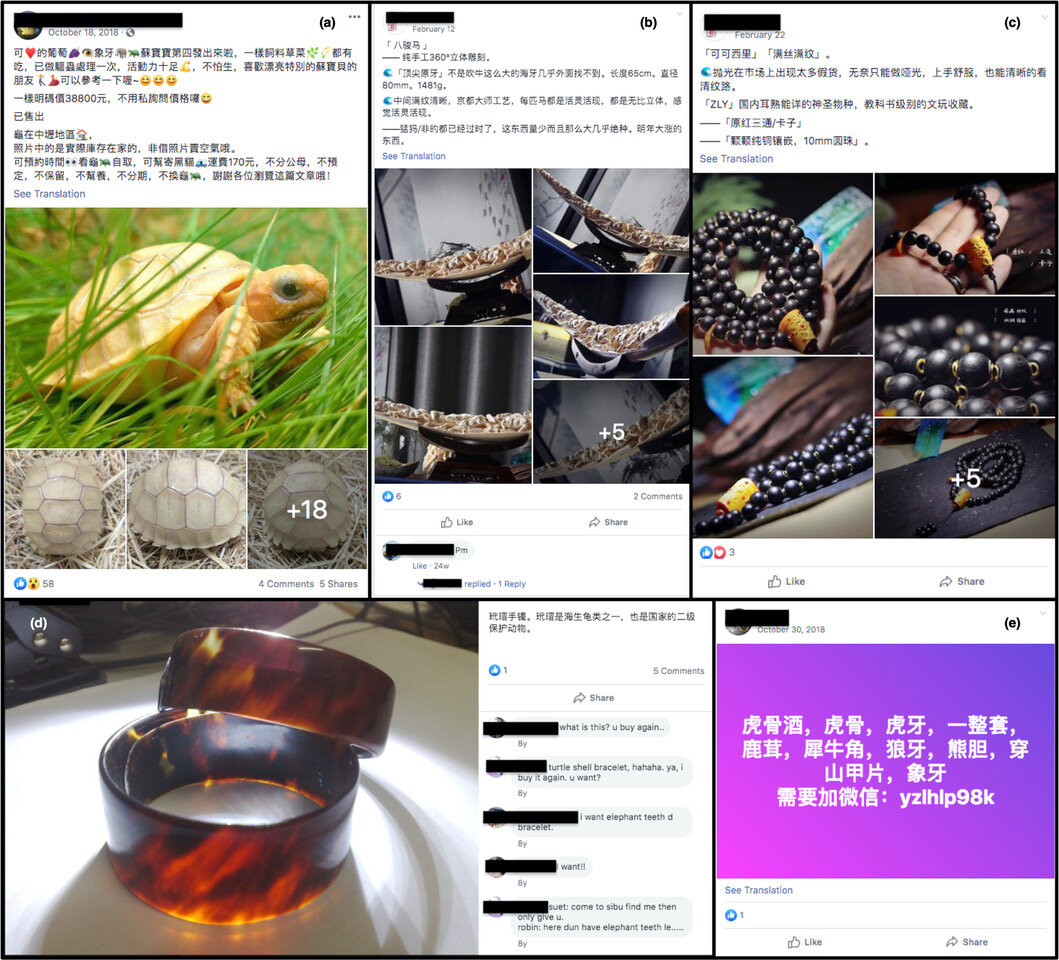
The Illegal Wildlife Digital Market: An Analysis of Chinese Wildlife Marketing and Sale on Facebook
At an estimated US$19 billion, the illicit wildlife trade is a serious threat to global conservation efforts. This criminal enterprise is now digital, expanding its footprint to consumers internationally by using the Internet and social media platforms. Read the report.
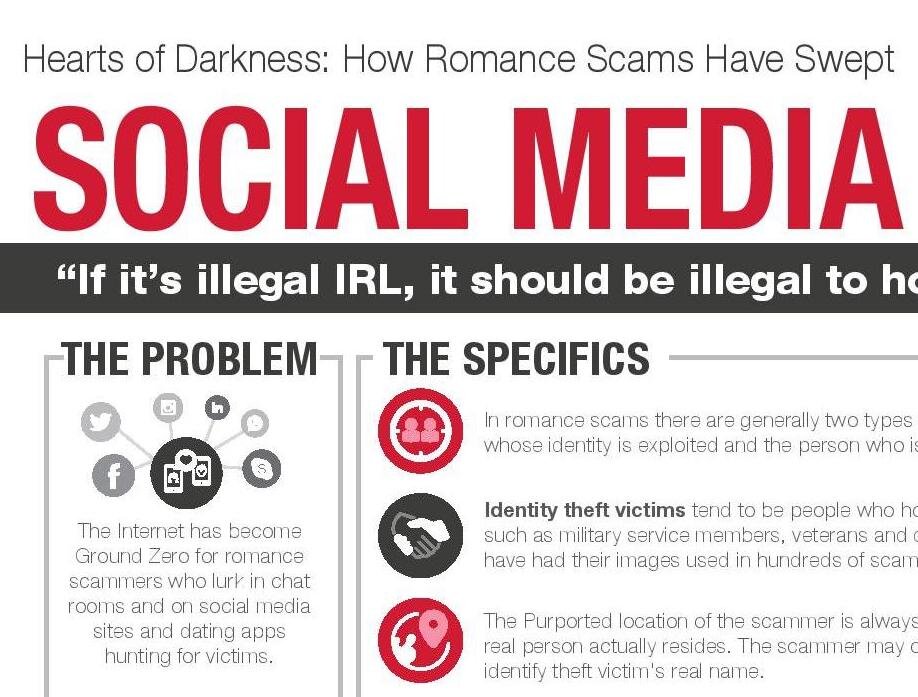
The Human Remains Trade on Social Media Fact Sheet
The Internet is ground zero for romance scammers and every year, thousands of people get sucked into romance scams on social media that have defrauded victims of more than $475 million in 2019 alone. Download our fact sheet to learn how romance scams have swept social media.

Facebook’s Flawed Plan to End Antiquities Trafficking
Facebook's new policy of banning the sale of historical artifacts is a welcome first step. But of their moderation strategy of deleting any content that violates their Community Standards also means that crucial evidence of war crimes is destroyed. Read more in the Foreign Affairs article.

Facebook, Citing Looting Concerns, Bans Historical Artifact Sales
The company announced the prohibition after researchers reported that looters were using the platform to identify and sell illegally excavated antiquities. Read the New York Times article.

Facebook bans 'loot-to-order' antiquities trade
Facebook has banned users trading in historical artefacts on the site. It follows a campaign by academic researchers and an investigation by BBC News, exposing how items looted from Iraq and Syria were sold on Facebook.

This machine-learning upstart trained software to snare online drug dealers. Now it's going after fake coronavirus test equipment peddlers
Machine-learning software to snare scammers hawking fake COVID-19 test kits on social media is being built by a tiny startup funded by ACCO expert Dr Tim K Mackey. Read the article.

Twitter-Based Detection of Illegal Online Sale of Prescription Opioid
A five-month investigation conducted in 2015, found a total of 1778 tweets that were identified as marketing the sale of controlled substances, 771 tweets were detected as marketing the sale of fentanyl. 90% had embedded hyperlinks, 46 were “live” at the time of the study’s evaluation. Some online pharmacies originated in high-risk countries such as Pakistan where individuals have been prosecuted for illegal importation of opioids. Read the report.

Illegal Online Trade in Endangered Parrots
This study of online trade in wild-sourced parrots is the first study of its kind about this highly threatened group of birds. By analyzing information contained within social media posts and public databases regarding trade in grey parrots over a four- year period, this investigation provides new insight into the scope and scale of trade, trade routes, modes of transport and the extent of compliance with national laws and international agreements. Read the report.

Coronavirus scammers are flooding social media with fake cures and tests
For years, Tim K Mackey has been researching the sale of opioids and illicit drugs online, tracking how dealers have used social media to push controlled substances. But over the past few weeks, he has found himself trying to track the black market for fake Covid-19 tests and treatments. Read the article.

Thousands of Tweets Associated to the Online Sale of Prescription Opioids
Another investigation conducted in 2017 found that among 213,041 tweets containing keywords codeine, percocet, vicodin, oxycontin, oxycodone, fentanyl, and hydrocodone, 692 were associated with illegal online marketing and sale of prescription opioids. Among “live” tweets, 44% directing consumers to illicit online pharmacies, 32% linked to individual drug sellers, and 21% were used by marketing affiliates. In addition to offering the “no prescription” sale of opioids, many of these vendors also sold other illicit drugs. Read the report.

A Machine Learning Approach for the Detection and Characterization of Illicit Drug Dealers on Instagram: Model Evaluation Study
Social media use is now ubiquitous, but the growth in social media communications has also made it a convenient digital platform for drug dealers selling controlled substances, opioids, and other illicit drugs. Previous studies and news investigations have reported the use of popular social media platforms as conduits for opioid sales. This study uses deep learning to detect illicit drug dealing on the image and video sharing platform Instagram. Read the report.

Smuggled, Beaten and Drugged: The Illicit Global Ape Trade
Follow Daniel Stiles, a self-styled ape trafficking detective in Kenya, on a sting, which began on social media. Read the New York Times article.

Automatic Detection of Potentially Illegal Online Sales of Elephant Ivory Via Data Mining
In this investigation, ACCO member David L. Roberts developed an automated system to detect potentially illegal elephant ivory items for sale on eBay. This work is an important step towards reducing poaching. Read the report.

How Facebook Groups Became a Bizarre Bazaar for Elephant Tusks
This investigative article by Wired looks at how Facebook Groups hawk wildlife and their products buyers across the globe. A team of experts, including ACCO Executive Director Gretchen Peters, weigh in on how to stop them. Read the article.

How Facebook became home to a thriving illegal wildlife marketplace
In this article/podcast, ACCO Executive Director Gretchen Peters describes how criminal networks operate on Facebook and are contributing to extinction of the elephant. Read the article.

Fighting for Animals
Front-line anti-poaching efforts are vitally important. The brave park rangers out in Africa's wild spaces must continue the hard and dangerous work they are doing. But we must complement what park rangers are doing by targeting the systems that facilitate the sale of illegal wildlife products to consumers. Read our Story Map.

Don’t call me the 'Indiana Jones' of Syria
Podcast by the BBC on Amr Al-Azm, who set up a network of frontline archaeologists - some of them former students and colleagues - that have been risking their lives to protect what remains of Syria's cultural heritage. Listen to the podcast.

Facebook’s Black Market in Antiquities: Trafficking, Terrorism and War Crimes
Amr Al-Azm and Katie Paul investigate how Facebook’s rapid growth and lack of internal policing mechanisms over the past decade have helped the platform become a digital black market where users buy and sell goods, including illicit antiquities, from some of the world’s most conflict-ridden nations. Read the report.

Smugglers Are Using Coronavirus Lockdowns To Loot Artifacts
A group that tracks looted artifacts online says that thieves in the Middle East and North Africa are taking advantage of coronavirus lockdowns to pillage archeological sites and sell their finds on online black markets. Read the article.

Facebook’s Black Market in Antiquities: ICOM Redlist Artifacts Offered on Facebook
This catalogue by Amr Al-Azm and Katie Paul has been compiled to illustrate examples of illicit cultural goods that have in fact been stolen and marketed on Facebook. These products match the ICOM Red Lists for Egypt, Iraq, Syria, Libya and Yemen. Read the report.

Quantitative Analysis of Open-Source Data on Metal Detecting for Cultural Property: Estimation of the Scale and Intensity of Metal Detecting and the Quantity of Metal-Detected Cultural Goods
Metal detecting is an understudied activity, from. the motivations and modes to the legal regulation of its practitioners and their markets throughout the world. This study by Sam Hardy analyzed the scale and intensity of metal-detected cultural goods through online forums and social networks in 13 different countries. Read the report.

Online antiquities smugglers are taking advantage of the coronavirus crisis
The online trade of illicit antiquities seems to be on the rise during the coronavirus crisis. The ATHAR Project, which investigates and documents the digital underworld of trafficking in looted artefacts, has found an uptick in posts on Facebook groups involved in buying and selling looted objects from the Middle East and North Africa. Read the article.

Concern Over Social Media Trafficking of Great Apes
Before the Internet, live wild animals, plants and their products were normally traded in physical market places, auction houses or shops, limiting their numbers. Now, thousands of traders are selling millions of wild animals. This report, by ACCO member Dan Stiles, investigates the illegal trading of great apes.

‘Black Archaeology’ in Eastern Europe: Metal Detecting, Illicit Trafficking of Cultural Objects, and ‘Legal Nihilism’ in Belarus, Poland, Russia and Ukraine
Across Eastern Europe, metal detectors are being used to empty archaeological sites of metal objects, despite significant efforts to combat illicit trafficking of cultural objects. This study by Sam Hardy presents an open-source analysis of online and social networks for the sale and ownership of metal detectors. Read the report.

Antiquities looted in Syria and Iraq are sold on Facebook
BBC investigative report, featuring Amr Al-Azm, about how Facebook is being used by terrorist organizations such as the Islamic State to buy and sell looted antiquities. Read the article.

Terrorists are trafficking looted antiquities with impunity on Facebook
Quartz reports on how networks of criminals are trading priceless Middle Eastern antiquities - from entire Roman mosaics to full Pharaonic coffins - on Facebook and there are no rules to stop them. Read the article.

AI can help find illegal opioid sellers online. And wildlife traffickers. And counterfeits.
The government is investing in an AI-based tool that could help catch illegal opioid sales on the internet. But the same approach could find lots of other illicit transactions. Read the Vox article.

Wildlife Traffickers Use Facebook, Instagram to Find Black-Market Buyers
Social networks and online marketplaces have long been hubs of illegal activity, including exotic animal trafficking. Smugglers use the platforms as digital billboards, often sharing photos and videos of their merchandise for users around the world to see. Read the Bloomberg article.

Cyber sleuths crack down on online wildlife crime
Attempts to clamp down on the online illegal wildlife trade have been boosted by more than a dozen recent interventions by law enforcement agencies in Europe, data collated by the #WildEye tool by Oxpeckers shows. The majority of these interventions resulted in convictions and arrests in cases involving several hundred thousand euros. Read the Earth Journalism Network article.

Cheetahs ‘being pushed to the brink of extinction’ by selfie-loving sheikhs’ ‘insatiable demand’ for big cat pets
The big cats are popular pets in the Middle East where a cub sells for up to £15,000. Three in four of the cubs die before reaching their prospective buyers, according to The Sun. Read the article.

African grey parrots: How social media is facilitating both illegal trade and the fight against it
As endangered African grey parrots are removed in their hundreds from the forests of their natural habitats, a new study has highlighted how social media facilitates this trade and how governing bodies, airlines and technology companies can play their part in preventing it. Read the article.

The Mainly Nameless and Faceless Dead: An Exploratory Study of the Illicit Traffic in Archaeological and Ethnographic Human Remains
This paper by Damien Huffer studies the current global trade in human remains, in particular those from archaeological or ethnographic contexts, through keyword searches on common search engines and e-commerce sites. Read the report.

Political Candidate Blasted For Giving Boyfriend Human Skull As Birthday Present
A woman running in this year's federal Canadian election has been slammed for giving her boyfriend a human skull from the 1700s as a birthday gift. The gift is particularly controversial because of a widespread historical failure to properly repatriate Indigenous remains. Read the Newsweek article.

Ah, I See You Have A Policy: A Screenshot Essay on the Trade in Human Remains
From Shawn Graham’s blog, Electric Archaeology, pointing out the discrepancies between Big Tech’s polices towards human remains and their actions. Read the article.

The Dark Side of Social Media: The Case of the Mexican Drug War
Research exploring the use of social media platforms has largely ignored the fact that these communication outlets provide major opportunities for criminal organizations, such as the Mexican Drug Cartels, to engage in public relations strategies, ease their recruitment tactics, send threatening messages to government authorities, civilians, and to warn off potential rivals. Read the report.

On Social Media, Cancel Drug Cartels: Make Facebook and Twitter Purge Content From Violent Criminal Organizations
President Trump has called for an all-out assault on violent Mexican drug cartels and the brutal MS-13 street gang. Therefore, it is hard to understand why the White House has included language in the USMCA trade agreement that would give social media platforms broad immunity for hosting user-generated content. Read how these two issues are related in the New York Daily News article.

The illegal trade in freshwater turtles and tortoises, including species on the brink of survival, to supply the pet trade, is a multi-million-dollar industry. The scale of the trafficking gives cause for serious concern about the ability of some of the plundered populations to recover in the wild. The Wildlife Justice Commission launched Operation Dragon in 2016 to shine a spotlight on the crimes, the criminals and the corruption that facilitates trafficking.

Your Power, Our People, The World’s Defense, in More Ways Than One: A Look at Reporting Fake Profiles
In this report, ACCO experts Kathy Waters and Bryan Denny focused on revealing fraudulent accounts on Facebook and found issues with ineffective procedures and platform security. Read the report.

Facebook Connected Her to a Tattooed Soldier in Iraq. Or So She Thought.
Renee Holland sent her Facebook friend thousands of dollars. She became entwined in global fraud that the social network and the United States military appear helpless to stop. Read The New York Times article.

Catfisher Scams Widow Out Of $1,000,000
Catfishing is the #1 way adult women in this country are being scammed. In this episode, ACCO expert Bryan Denny talks about his experience being used as “bait” for romance scams. Watch the show.

80-Year-Old Widower Lost $200K In Catfish Scam Involving Chinese Lion Sculpture
An elderly man was persuaded to send $200,000 to a scammer who convinced him he was funding the transportation of a 500-ton marble lion sculpture from China to a Florida art gallery. Read the Oxygen article.

Mexico's Drug War and Criminal Networks: The Dark Side of Social Media
Mexico's Drug War and Criminal Networks by ACCO expert Nilda M. Garcia examines the effects of technology on three criminal organizations: the Sinaloa cartel, the Zetas, and the Caballeros Templarios. Buy the book.

The Deadly, Underground World of Dogfighting on Facebook
Despite the widespread prohibition of illegal dogfighting, this cruel activity is easy to find on social media platforms, facilitated by the rapid growth and widespread use of the Internet, and the difficulties enforcement agencies face in tackling this largely hidden crime. Read the report.

Facebook Used to Promote Illegal Dogfighting, Puppy Trading, Animal Rights Group Finds
Following an investigation, Lady Freethinker (LFT), a Los Angeles-based nonprofit animal rights media organization, concluded that Facebook failed to enforce their own policies against violent content and the sale of animals by frequently allowing dogfighters to promote their trade to global users on the social media platform. Read the Newsweek article.

Facebook ‘gives global platform to illegal dogfighting’
Facebook has been accused of giving a global platform to dogfighting after an investigation found the site is being used by fight organisers and unscrupulous puppy traders. Read the Guardian article.

Online Reviews Are the Wild West, and There’s No Sheriff
For several years, ACCO expert Kathryn Dean has been combing through online review sites, particularly Yelp and Google, documenting thousands of fake reviews by hundreds of businesses. Almost everything she has found originates on Facebook. Read Dean’s op-ed.

Facebook used as a platform to promote dog fighting, report finds
Facebook has come under criticism for not doing enough on dog fighting, a practice which is illegal in numerous countries around the world. The report, published by animal rights organisation Lady Freethinker, highlights how dog fighting content is easily found on the platform, and how the company has failed to enforce its own policies against the practice. Read the Mashable article.
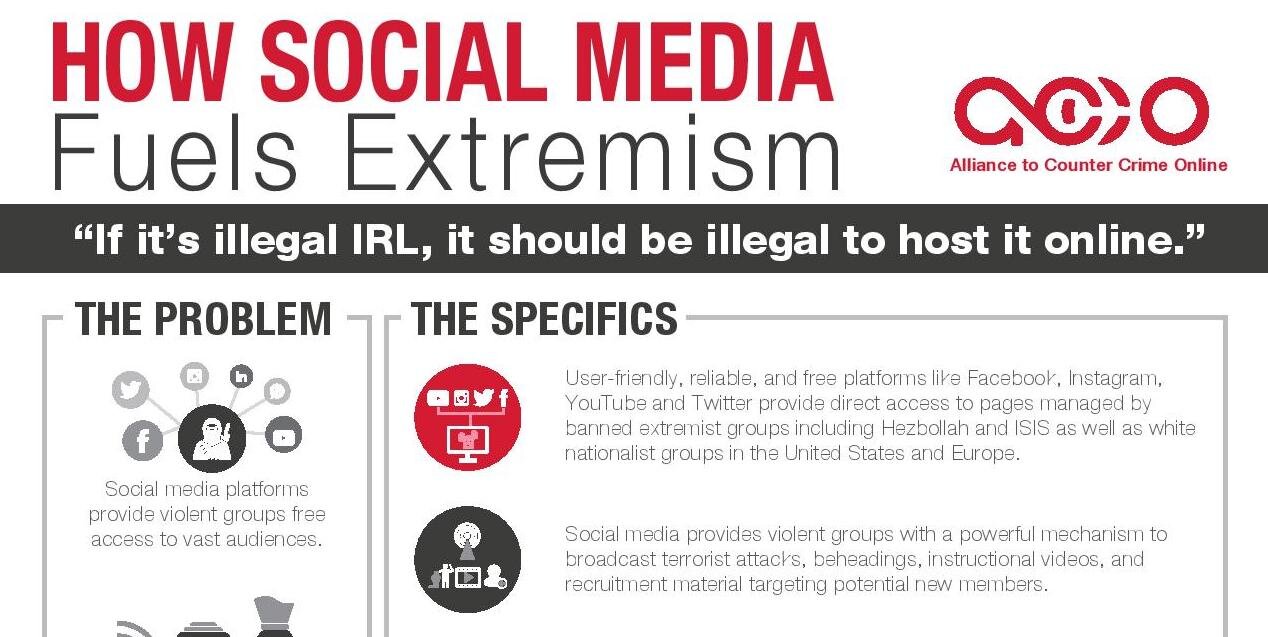
How Social Media Fuels Extremism
Terror groups have weaponized blogs, Facebook groups, news feeds, and tweets to fundraise, broadcast attacks, recruit new members, and provide training. Learn how social media amplifies this illicit content.

Financing of Terrorism and Social Media Platforms
In January and March 2020, the Counter Extremism Project (CEP) conducted a study to evaluate the current defense mechanisms of large social media platforms against the misuse of their services by financiers of international terrorism or for the financing of terrorism. Read the report.

We’ve Tracked Extremist Content on Facebook for Years: It Doesn’t Get Removed for Long
As Facebook bends to mounting pressure to stem the spread of domestic extremist content and conspiracy theories, declaring an expansion of hate-speech policies and shutting down recruiting efforts by militia groups, it’s pertinent to look at Facebook’s track record for responding to foreign extremism on its platforms. Read the article on Morning Consult.

The Lucrative, Shady Market in Fake Reviews
Reveal takes a deep dive into the trade in fake reviews that engages doctors, small businesses, and pizza shops too across Yelp, Facebook and Google. We’re guided on our journey by former fraud investigator Kay Dean, whose own encounter with fake reviews took her into the world of Black Hat Marketing. Listen to the podcast.

Fake online review fraud: California agencies are not protecting consumers
Review websites are riddled with fake reviews foisted upon consumers by the tech companies who take advantage of federal legislation that holds them unaccountable for user generated content. Read the article.

Black market in Google reviews means you can't believe everything you read)
Dean has spent the past three years uncovering these networks, spurred by her own negative experience with a medical practitioner in California who had fake reviews. Her research laid the foundation for CBC's investigation. Read the article.

Fake patient reviews are making it increasingly hard to seek medical help on Google, Yelp and other directory sites
From rehab centers to family doctors, patients trying to find good medical care are increasingly finding fake consumer reviews — and there are no signs of an imminent crackdown. Read the article.

Why We Should Not be Trading Human Bones on Instagram
We shouldn’t need a law explicitly declaring “No one can own dead people,” though perhaps that would help. We need enforcement of the laws that we do have. Read the article.

Cyberspace: Newly Contested Turf for Gangs and Cartels
Platforms like Facebook, WhatsApp, and Instagram enable gangs and drug cartels to taunt and threaten rivals, sell drugs and contraband, coordinate violent attacks, and lure victims into dangerous and sometimes deadly situations. Download the fact sheet.

Fake Review Fraud
Much of the buying, selling, and trading of fake online reviews occurs on Facebook. ACCO research has identified more than 50 Facebook groups encompassing about 100,000 members engaged in faking business reviews on Google, Yelp, and other sites. This is likely just the tip of the iceberg. Download the fact sheet for more.
















































































